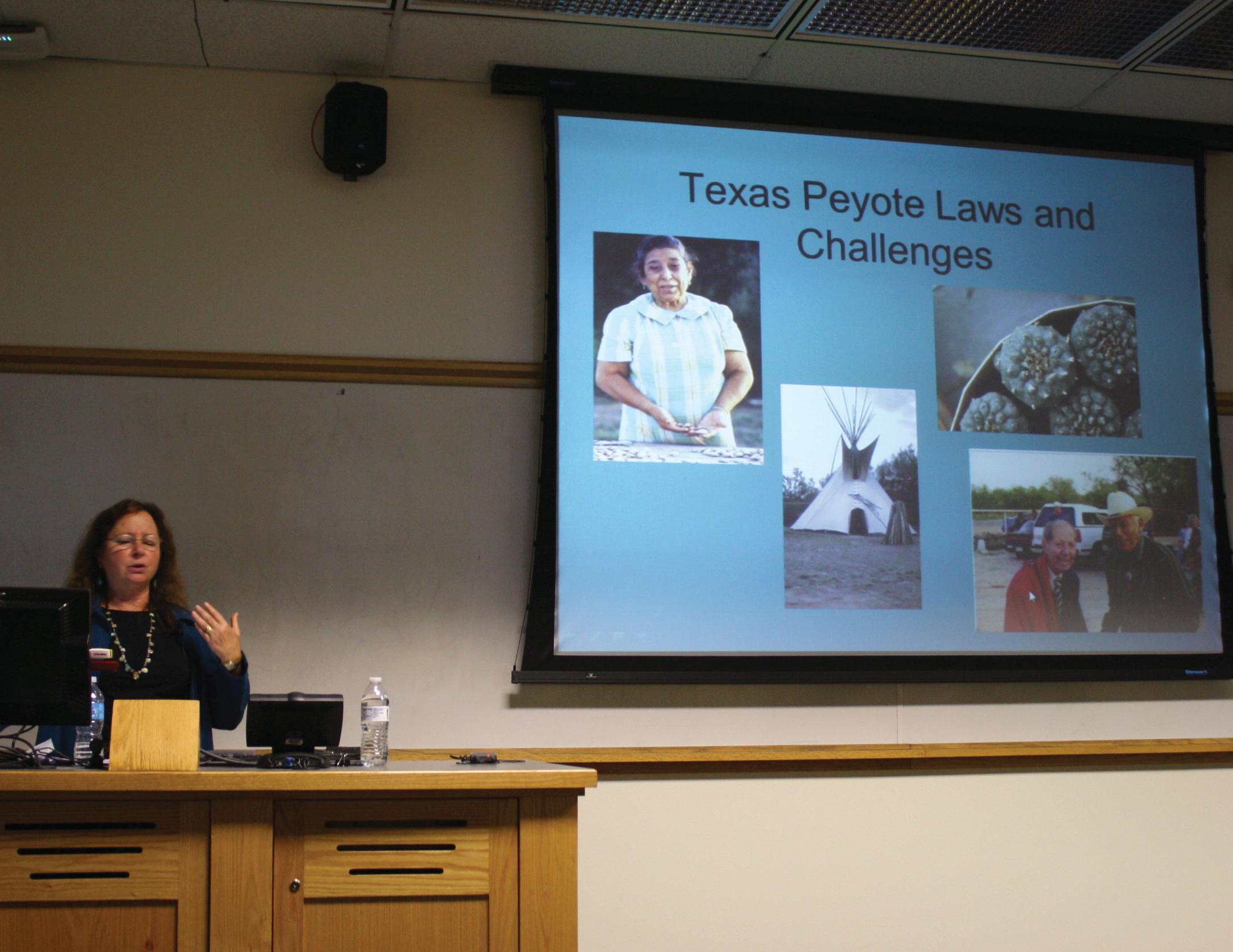Schaefer: Peyote teaches love
Cultural anthropologist Stacy Schaefer joined the USU Museum of Anthropology on Friday night to discuss peyote as a religious rite, and a woman who dedicated her life preserving it.
Peyote, a cactus native to Mexico and southwestern Texas, is an entheogen – a psychoactive substance – known for its use in religious practices. Schaefer said the use of the psychodelic has been documented back to the indigenous Native Americans, and is now part of religious ceremonies in the Native American Church.
“In essence, looking at peyote as a psychic integrator, you take this within a religious context,” she said. “It facilitates the healing and union of the body, the mind, the soul and the psyche.”
It was while working in southern Texas that Schaefer said she first met Amada Cardenas, the first legal and licensed peyote dealer.
“And I am so glad I did,” Schaefer said.
In her lecture titled “Stories of Love, Hope, Faith and Charity in the Peyote Gardens of South Texas,” Schaefer recounted the removal of Native American tribes from their homelands by the U.S. government: Tribes in Texas were sent to reservations Oklahoma in the early 1900s. This is where the Native American Church began, combining Native American and Christian beliefs.
According to Schaefer, the church brought hope to a people who lost their pride and sense of identity. Peyote was used by the church to heal emotionally and physically.
“It is an intrical part of practicing that religion,” she said. “So, if you become a member of the Native American church, you consume peyote.”
Amada and her husband, Claudio, were considered “stewards and the keepers of the peyote.”
Schaefer said the Cardenas were very respectful in their dealings with the medicine. Their home in southern Texas became a sacred place for many people. Schaefer called it “a tranquil oasis in the borderlands.”
Members of the church held their yearly meetings on the Cardenas’ property, also known as the Peyote Gardens. Schaefer and her husband were invited and attended a meeting. She recounted the love and care she felt from Amada, and shared the accounts of others who had visited Amada’s home, to be healed and feel her love.
“As I got to have a better understanding of this place, I realized that I needed to write her story,” Schaefer said. “I wanted people to remember Ms. Cardenas…her kindness and her story.”
Psychoactive drug laws passed in the 1970s put major
strain on the church, but Amada and her husband continued to sell the medicine. Schaefer said Claudio was arrested and sent to jail at one point. An exemption was later made for members of the Native American Church to use peyote as a sacrament, and it is still used today.
Amada passed away in 2005, right before her 101st birthday. Schaefer said she is currently working to publish a book about Amada’s life, and her influential role in the lives of so many people.
“I can only use Amada as an example of what the medicine teachers and what the medicine is all about,” she said. “She was the most loving person – unconditional love for everybody. I think that’s what peyote teaches.”
Bonnie Glass-Coffin, a professor of anthropology and religious studies at USU, said Schaefer’s perspective and study of the religion is respectful, while celebrating and protecting of its diversity.
“It’s a topic that’s important for us to know about, as being worthy of respect,” she said. “The study of Ms. Cardenas, the oral history of a selfless woman who brought people together and created an umbrella of peace, is a story that needs to be told.”
Schaefer is the co-director of the Valene L. Smith Museum of Anthropology at California State University Chico. Her visit was part of the Anthropology Lecture Series, hosted by the anthropology museum located in Old Main.
Prairie Fox, a junior majoring in anthropology and political science, said she likes that the invited speakers are professors from out of state, bringing new perspectives from their field.
“It allows us to have people talk about things we really don’t address here,” said Fox, using Schaefer as an example. “Everyone talks about peyote as a bad thing, and as a drug…She discussed the more human and religious side of it.”
The next lecture will be 6 p.m. on Friday, Nov. 22. All lectures are free and open to the public.
-manda.perkins@hotmail.com

